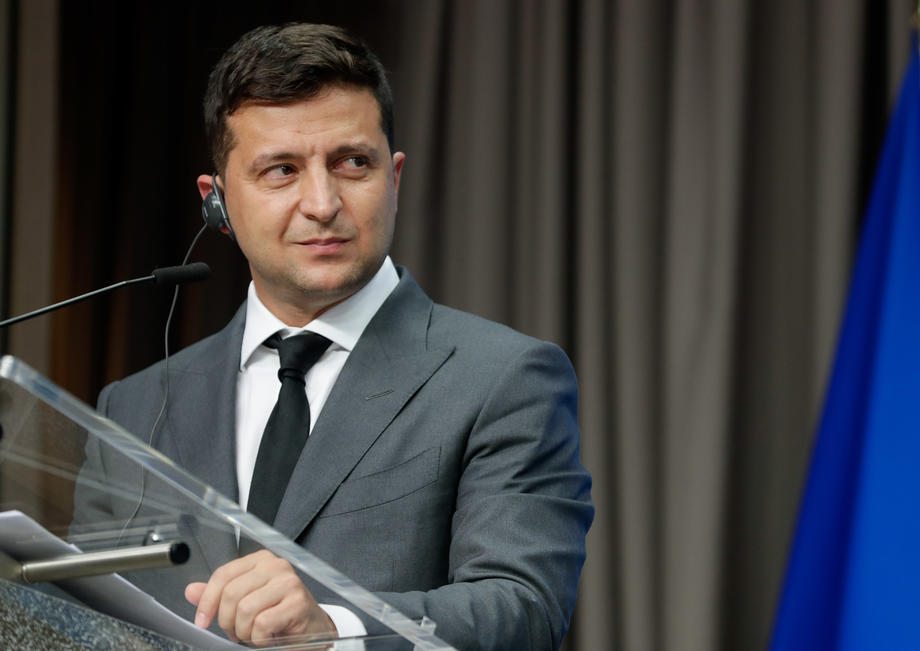KYIV
Ukrainian President Volodymyr Zelensky suggested face-to-face talks in the Vatican with Kremlin leader Vladimir Putin on ending seven years of conflict in the east of his country, but Russia heaped new scorn on his dogged bid for a meeting and dismissed Ukrainian calls for a new approach to securing peace.
Zelensky told the Italian daily La Repubblica – a week after Russia said it was scaling down a buildup of troops on Ukraine’s border — that the moral authority of the Holy See would boost efforts to end the fighting pitting Ukraine’s army against Russian-financed separatists and their unrecognised “people’s republics” in the Donbass region.
But the two sides were clearly mired in a dialogue of the deaf after seven years of sporadic violence in which 14,000 have died.
Putin says Ukraine is gripped by civil war, rules out any discussion of Donbass and says Kyiv must talk to the separatists. Ukraine says Russia is the instigator and will have nothing to do with “Russian puppets”.
“The Vatican is truly an ideal place for dialogue about peace. The Holy See is a global moral authority that always acts effectively as a mediator, as it is impartial and it inspires trust among all parties to the conflict,” Zelensky told La Repubblica.
“That is why the Apostolic Capital has often been used in history to resolve conflicts between states and build a peaceful future.”
Kremlin spokesman Dmitry Peskov scoffed – again — at the idea.
“President Zelensky said it would be an ideal place for a meeting. But, of course, neither the Vatican nor Russa knows anything about this,” Peskov told reporters in Moscow. “We have so far received no information that this proposal is concrete and fully presented.”
He repeated Putin’s suggestion that Zelensky was welcome for bilateral talks in Moscow – but as Russia was “not a party to the conflict” there could be no talks on it.
Zelensky issued a proposal to meet Putin in Donbass last week amid the mass deployment of Russian troops in Crimea – annexed by Moscow seven years ago – and in Russian regions adjacent to Donbass.
He also appealed for discussions within the framework of the four-nation “Normandy” format, including France, Germany and Russia, and a three-sided forum in Minsk, capital of neighbouring Belarus – the latter has produced two largely unfulfilled agreements amounting to a “road map” to peace.
Russia said the mass deployment was an exercise in response to aggressive moves by the NATO alliance. But some of the equipment was left in place along the border and Russia’s intentions over the coming months remain unclear.
Mutual jabs by foreign ministers
The dialogue of the deaf intensified at the level of the two nations’ foreign ministries.
Ukrainian Minister Dmytro Kuleba told the BBC that Kyiv would never talk to the separatist leaders who hold about 7 percent of the country’s territory.
“No. This is the red line we will not cross. My president is very firm on that,” Kuleba said.
“We all know that it was Russia who attacked Ukraine. We all know that the key to the resolution of this conflict is in Moscow, and we are not going to talk with their proxies.”
Veteran Russian Foreign Minister Sergei Lavrov was equally dismissive.
He rejected Zelensky’s call for a revision to the Minsk ceasefire accords, specifically Ukraine’s demand that the separatist-held areas be restored to its control before any local elections or a referendum on their future.
“Control of the border is the very last move that comes only after those territories get a special status fixed in the Ukrainian Constitution and hold free elections acknowledged as such by the Organisation for Security and Cooperation in Europe,” the veteran minister told Russian television.
“I believe that we mustn’t let Mr. Zelenskyy and his team get off the hook, even though they are trying hard to wriggle out.”
Ukrainian analyst Vitaly Portnikov called on Zelensky to stop seeking a one-on-one meeting with Putin.
“Such talks are a humiliation for him and a humiliation for the country,“ he said on his Telegram channel. “With Putin, talks can only take place in a multilateral format. “If only to put pressure on the Russian leader.”

